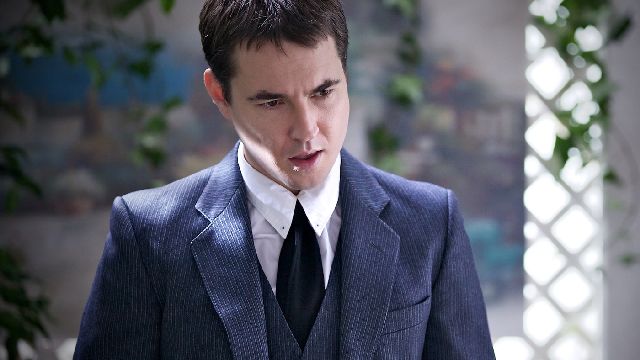The Wee Man (2013) 

Director: Ray Burdis
Cast: Martin Compston, Patrick Bergin, John Hannah
Synopsis: The true-life story of Paul Ferris.
While The Wee Man, writer-director Ray Burdis’s first movie in thirteen years, provides an entertaining, well-acted slice of Glaswegian gangster life, his choice of subject matter and the painfully obvious bias of the storyline can only leave any informed audience with a nasty taste in the mouth. Paul Ferris, upon whose autobiography the movie is based, was a vicious career criminal, charged at various times with the murder of seven people, and yet Burdis’s script paints a portrait of him as a basically decent man who finds himself sucked into a life of crime after he finally works up the courage to defend himself against a gang of brothers who had persecuted him since childhood. Even this act of violence is softened by having it take place while the brothers are in the process of raping a young woman, and from then on, despite confessing to his sister that he enjoyed the violence, he is almost always shown to be a reluctant practitioner.
The film opens in the 1970s, when Ferris was a young boy (Daniel Kerr) growing up on a tough Glasgow council estate. From his bedroom window he sees three uniformed police officers viciously beat a man, an incident which establishes the blurred lines between right and wrong, good and bad, and essentially explaining how easy it is for good people to drift into bad lives. His kindly father gives him three rules to live his life by: beware of strangers, stay loyal to loved ones, and be a lion not a lamb. However, through most of his childhood Ferris is bullied by the near-feral Banks brothers, and it’s only after years of provocation that he finally gives them a taste of their own medicine. Just what his decent father thinks of this is never explored as he more or less disappears for the remainder of the movie. In fact, Ferris never has to face up to any kind of dissection of why he becomes the man he does, other than a moment of self-analysis when he states his desire to escape his life of crime because he fears he has become the type of bully he despised as a child.
By now, the role of Ferris has been assumed by Martin Compston, who delivers the best performance in a movie that’s filled with them. Following his release from prison, Ferris is working for Arthur Thompson, Glasgow’s notorious crime boss, and ruffling the feathers of Arthur’s son, Junior (Stephen McCole — another superb performance), a drug-addicted bully whose cowardly streak is disguised by arrogant bluster. When Junior feels that Ferris is replacing him as his father’s number two, he decides to usurp Arthur and eliminate Ferris. He’s encouraged in his subterfuge by Tam ‘The Licensee’ McGraw (John Hannah), a Machiavellian rival gangster who sees the unrest in the Thompson camp as a means of strengthening his own position in the Glasgow underworld. This intrigue eventually culminates in a violent and costly gang war.
The Wee Man is a solidly crafted gangster movie which stands head-and-shoulders above the majority of the slew of British gangster flicks released in the past ten years. If viewed as fiction — which it surely is — it provides an absorbing insight into a way of criminal life which is the antithesis of so many similar movies which are played out in swanky nightclubs and plush penthouses. Here, the crime lord’s office is the snug bar of the local spit-and-sawdust pub, and the lives and business of these wealthy criminals are located firmly in the heart of the working class haunts. It does, however, feel like an elaborate public relations exercise for a man who, by most accounts, appears to be a deeply unpleasant individual, and this is a fact which understandably appears to have coloured many views and opinions of the movie, and which undoubtedly weakens the movie as a whole.
httpv://www.youtube.com/watch?v=NUKgcu_lpLU
